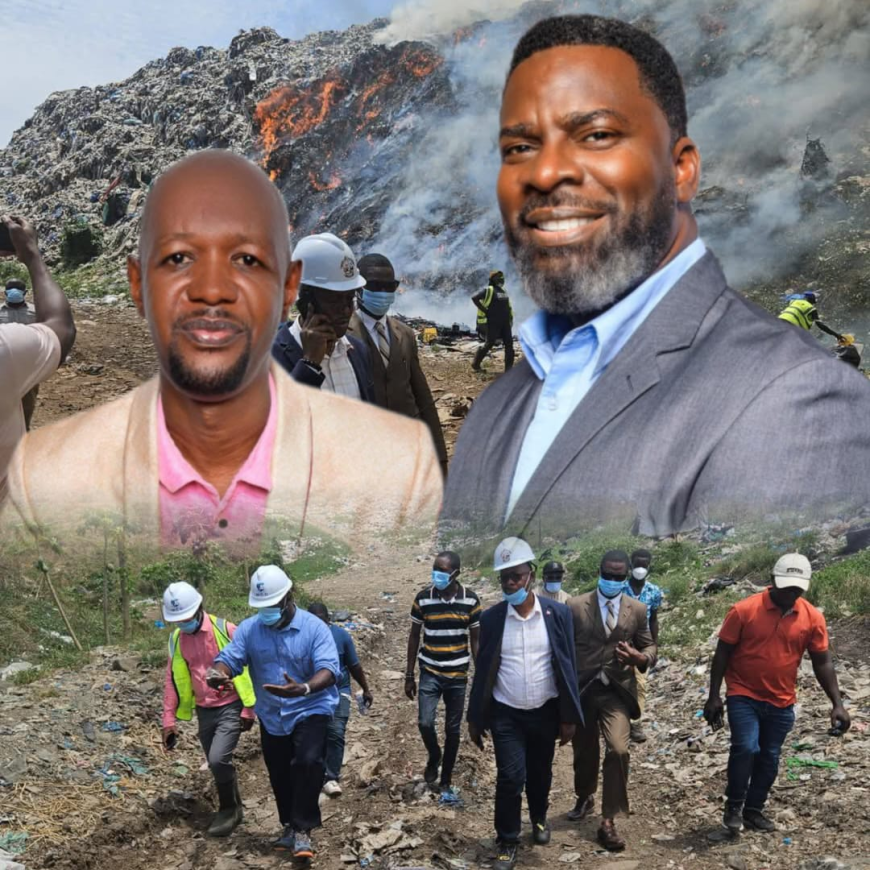Wein Town Landfill Becomes a Disastrous Symbol of Negligence, Despite Authorities Repeated Assurances

Monrovia, Liberia: Following the catastrophic fire that engulfed the Wein Town Sanitary Landfill in Paynesville City on Thursday, March 20, during the early afternoon hours, Monrovia City Mayor John-Charuk Siafa and Paynesville City Mayor Robert S. Bestman II have acted quickly to control the damage from what has become an embarrassing testament to Liberia’s chronic waste management failures.
The landfill, an already overwhelmed dumping ground long past its intended lifespan, has now been reduced to a slowly burning pile of waste, with thick clouds of toxic smoke rolling into the atmosphere, causing health hazards for community dwellers.
In a press statement meant to reassure an increasingly frustrated public, Mayors Siafa and Bestman acknowledged the gravity of the crisis, pledging a robust response to mitigate the life-threatening situation.
A special technical committee of inquiry has been hastily formed to investigate the fire, promising findings and recommendations.
The immediate priority, officials claim, was to contain the fire, but given the scale of the blaze and the glaring inadequacy of firefighting infrastructure, expectations remain low.
Residents of Wein Town and surrounding communities have not been afforded the luxury of waiting for bureaucratic processes to unfold.
The intoxicating smoke emanating from the landfill poses immediate health risks, with children and elderly individuals already exhibiting symptoms of respiratory distress.
Those living closest to the site have reported an unbearable odor and thick layers of carbon dust settling on their homes, yet official responses have largely consisted of unclear assurances and political pretentiousness as the landfill was never meant to reach this state of dysfunction.
Established in 2011 with financial backing from the World Bank, the facility was designed as a modern sanitary landfill, part of a broader strategy to phase out uncontrolled dumping across Monrovia and Paynesville Cities.
It was a well-intentioned initiative—on paper; however, systemic neglect, poor waste management policies, and a complete lack of planning have transformed the landfill into a deteriorating environmental disaster.
For years, residents have voiced concerns about the landfill’s deteriorating conditions; alarming drinking-well contamination, frequent outbreaks of fire, and an overwhelming influx of waste far beyond its capacity have made it an impending time bomb.
Successive administrations have made token attempts at intervention, yet the fundamental issues persist with no proper waste segregation, no recycling initiatives, and no alternative disposal sites.
The fire has now forced Liberia’s authorities to confront an inconvenient truth, as the country’s waste management system is in absolute disarray.
While city officials rushed to assess the damage and contain the flames, it is impossible to ignore the broader implications of the environmental catastrophe.
With Monrovia and Paynesville generating thousands of metric tons of waste daily, the collapse of the landfill has left the cities with no viable disposal alternatives.
Garbage is already accumulating in the streets, clogging drainage systems and further deteriorating an urban landscape that has long suffered from mismanagement and neglect.
The Liberia National Fire Service, tasked with the duty of combating fire incidents, faces nearly impossible challenges owing to decades of underfunding and logistical shortcomings, which have left the agency ill-equipped to tackle a fire of this magnitude.
Reports indicate that fire trucks deployed to the site have been struggling to maintain a steady water supply, while firefighters work under hazardous conditions without proper protective working gear.
In any functional system, such a crisis would demand a full-scale emergency response. But in Liberia, however, even the most basic expectations of governance are often met with disappointment.
While Mayors Siafa and Bestman have assured the public that they are working closely with national and international partners to seek long-term solutions, for many community dwellers, these reassurances ring by far insubstantial.
Of late, the rapid urbanization of Monrovia and Paynesville Cities has placed an even greater strain on an already fragile waste management system.
Population growth, coupled with a lack of urban planning, has led to increased waste generation without corresponding infrastructural improvements.
The few waste collection systems in place have proven woefully inadequate, forcing many communities to resort to illegal dumping and open burning practices that exacerbate both environmental degradation and public health risks.
As the smoke continues to rise over Wein Town, the political implications of this disaster are becoming increasingly evident.
With the Boakai-Koung administration still finding its footing, the government’s response to this crisis will be scrutinized as a test of its commitment to governance and environmental stewardship.
The economic impact of the landfill fire also cannot be ignored, as businesses operating in the immediate vicinity of Wein Town have reported significant disruptions, with air pollution affecting worker productivity and customer foot traffic.
The informal waste-picking sector, which relies on landfill access for scavenging recyclable materials, has also been paralyzed by the fire, further compounding economic hardships for some of Monrovia’s most vulnerable residents.
With international donors and environmental organizations watching closely, Liberia’s government now faces a critical decision.
Edited: E. Geedahgar Garsuah, Sr.
What's Your Reaction?










































































